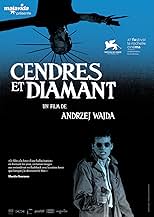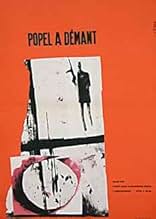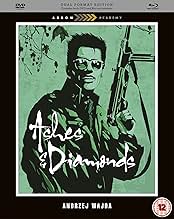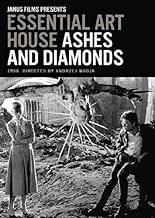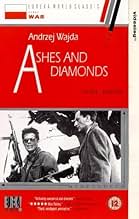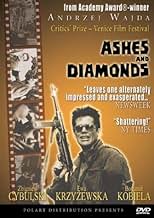Al término de la Segunda Guerra Mundial y la ocupación alemana, la resistencia polaca y las fuerzas rusas se enfrentan entre sí en un intento de asumir el liderazgo en la Polonia comunista.Al término de la Segunda Guerra Mundial y la ocupación alemana, la resistencia polaca y las fuerzas rusas se enfrentan entre sí en un intento de asumir el liderazgo en la Polonia comunista.Al término de la Segunda Guerra Mundial y la ocupación alemana, la resistencia polaca y las fuerzas rusas se enfrentan entre sí en un intento de asumir el liderazgo en la Polonia comunista.
- Dirección
- Guión
- Reparto principal
- Nominado a 2 premios BAFTA
- 1 premio y 2 nominaciones en total
- Stefka
- (as Barbara Kraftówna)
- Barmaid Lili
- (as Z. Czerwinska)
- Franek Pawlicki
- (as W. Grotowicz)
- Jurgieluszka
- (as I. Orzewska)
- Smolarski
- (as M. Loza)
- Puciatycka
- (as H. Siekierko)
Reseñas destacadas
The visual composition of the film is as masterful as the complexity of the characters and plot. Despite the notoriously bad film technology in the Soviet states and the constraints of Socialist Realism, the film manages not only to capture the potential richness of black and white, but also manages to avoid the standard pitfalls of over-zealous editing that often destroy other contemporary Soviet films. The frames are longer shots in general, and forced schematization through editing is all but absent. The precise composition of each scene throughout the film provides the visual coherency that would otherwise be imposed by careful editing; as an example, see the scene in which Maciek is underneath the staircase in the lobby of the hotel towards the end of the film, or the final "Polish" dance scene.
I would highly recommend some research into the political transitions of Poland in the years directly following WWI before viewing this film for the first time; this film was made for a particular audience who clearly understood certain cultural and historical references that a modern Western audience will inevitably miss (ie. "Were you in Warsaw?"). The thematic and emotional complexity of the film is also enhanced by an understanding of Polish history. I would highly recommend this film for any class examining Eastern Europe or Soviet Russia (which is the context in which I was introduced to this film in particular), or to anyone who would like to better understand the complexity of Cold War politics from a perspective behind the Iron Curtain.
It's really the way how this movie looks that made this an interesting and good watch for me. It features some beautiful black & white cinematography and it has some some really strong and unforgettable images in it.
The story in itself is being kept deliberately small and simple. The movie very rarely dwells, which is a good thing but it at the same time also prevents this movie from making a truly lasting impression with a good or powerful story. In my opinion the movie was lacking this, which prevented me from truly regarding this movie as a perfect movie, or a must-see classic, even though it is generally being regarded as perhaps the best and most definitive Polish movie ever made.
Neverhteless, the characters all do work out well, due to the movie its story and overall approach. It was also truly a pleasure to watch Zbigniew Cybulski act, who is known as the Polish James Dean. He was truly great and really solely carried the movie, for most part.
Due to the fact that the movie is being kept simple and small, there is also very little to indicate in this movie that it's actually one being set during WW II. Don't know whether this was done intentionally or not but anyway, I liked that about this movie. It's a war movie without the war and everything that goes along with that and basically all that ever indicates that there is war going on is shown by the presence of a few soldiers.
A solid but above all things beautifully directed movie, by Andrzej Wajda.
8/10
http://bobafett1138.blogspot.com/
1. Nothing is black or white, everything is just a shade of gray
2. Is death, no matter how you try to justify it, senseless?
3. Is it better to live, while on your knees or die standing straight? Or maybe it's better to try to live standing straight?
4. That sometimes it's not war that is hell, it's living through war and trying to live a normal life that is a lot harder (thank God I do not know if it is so)
Wajda's movie doesn't give direct answers to any of these questions - each person may watch the movie from a different point of view and get to a totally different conclusion. But even if you're not into psychological movies about war, or noir-movies (and Popiol i Diament is definitely a sort of a noir-movie) it's worth watching for just one scene - the burning vodka glasses at the bar - Cybulski at his best.
And lastly - the motto of the movie (and of the book as well):
"Will ash and chaos be left in the end, that follows a storm into abyss Or may a diamond be found in the ash, a dawn of an everlasting victory"
Cyprian Kamil Norwid
PS: I hope Mr Norwid will not turn in his grave at the quality of my translation but that part of a poem by CK Norwid sums up the movie really well.
¿Sabías que...?
- CuriosidadesCiudadano Kane (1941) - and Gregg Toland's cinematography in particular - was a huge influence on Andrzej Wajda at the time. Like Toland, the first thing the film's cinematographer Jerzy Wójcik did was convince production designer Roman Mann to include ceilings in all the sets.
- PifiasGlasses of vodka are set alight which burn for an unnaturally long length of time and with a bigger flame than expected, suggesting a purer fuel was used in the film, such as petrol. Moreover, when the final flame dies (c.41 minutes) no liquid remains in the glass. Only the alcohol content is flammable in any glass of spirit and a residue of water would be left behind with even the very strongest of Polish vodkas.
- Citas
Krystyna: Look. An old crypt. An inscription. "So often are you as a blazing torch with flames of burning hemp falling about you flaming, you know not if the flames bring freedom or death, consuming all that you most cherish. Will only ashes remain, and chaos whirling into the void." The letters are blurred. I can't read it.
Maciek Chelmicki: It's by Norwid. "Or will the ashes hold the glory of a starlike diamond, the Morning Star of everlasting triumph."
Krystyna: That's beautiful. "Or will the ashes hold the glory of a starlike diamond..." And what are we?
Maciek Chelmicki: You - are definitely a diamond.
- ConexionesEdited into CzechMate: In Search of Jirí Menzel (2018)
- Banda sonoraCzerwone maki
(Red Poppies) (uncredited)
Music by Alfred Schütz and lyrics by Feliks Konarski
Performed by Grazyna Staniszewska
Selecciones populares
- How long is Ashes and Diamonds?Con tecnología de Alexa
Detalles
Taquilla
- Presupuesto
- 6.070.000 PLN (estimación)
- Duración
- 1h 43min(103 min)
- Color
- Mezcla de sonido
- Relación de aspecto
- 1.66 : 1

